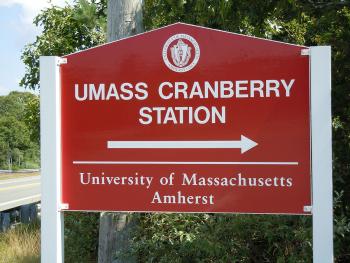The Cranberry Station
 Located in East Wareham, the Cranberry Station, a part of the UMASS Amherst Campus, is an outreach and research center charged with the mission of maintaining and enhancing the economic viability of the Massachusetts Cranberry Industry through research and outreach and serving the public welfare by supporting economic development and the protection of the environment.
Located in East Wareham, the Cranberry Station, a part of the UMASS Amherst Campus, is an outreach and research center charged with the mission of maintaining and enhancing the economic viability of the Massachusetts Cranberry Industry through research and outreach and serving the public welfare by supporting economic development and the protection of the environment.
The cranberry industry is an important part of the economy and character of Southeastern Massachusetts. Cranberry research and outreach programs have tremendous impacts on not only the more than 60,000 acres of land owned by the cranberry industry, but on all of the region. Land surrounding cranberry bogs accounts for much of the open space in the area. Water quality and preservation programs are of prime importance as cranberry growers own 22% of all surface water in Plymouth County. The continued viability of the cranberry industry, and other regional agricultural enterprises, is key to the economic vitality and non-urban character of this region.
The Cranberry Station programs are focused on the cranberry production system in the areas of systems ecology (including crop protection and sustainability) and the interaction of cranberry growing and the environment (abiotic factors and management). In our programs we emphasize efficiency, environmental protection, and profitability.
Current projects include the use of alternative cultural practices, especially flooding, to control insect, weed, and disease pests in cranberry, a study of the impact of phosphorus use in cranberry production on surface water quality, and physiological factors that may be limiting production.
The Cranberry Station is a leader in the development of IPM practices for cranberry growers and has developed and distributed Best Management Practices for cranberry production covering such topics as composting, nutrient management, water quality protection, and low cost/low input management. In 2003, A Best Management Practice for Fresh Fruit Growing was developed and published. In addition, Hilary Sandler participated in the revision of the Neighbor-to-Neighbor guide used by cranberry growers to educate their neighbors about cranberry farming.
The UMass Cranberry Station staff is responsible for:
- Advancing knowledge of cranberry related sciences including entomology, plant pathology, weed science, and basic and applied plant sciences, including plant nutrition and plant physiology.
- Researching and developing environmentally compatible technologies for cranberry production.
- Providing outreach programs regarding cranberry production for cranberry growers and the citizens of Massachusetts.
- Providing diagnostic services (disease, insect, plant nutrition, weeds) relating to cranberry production.
- Developing and implementing and IPM program for cranberries.
- Formulating and disseminating insecticide, fungicide, herbicide, fertilizer, and other management recommendations for cranberry production.